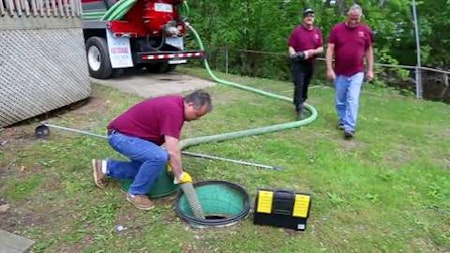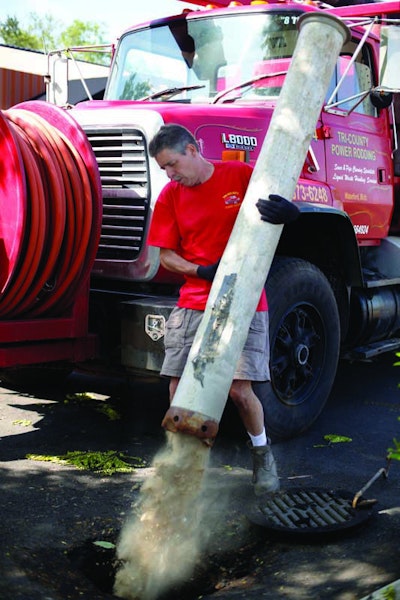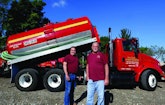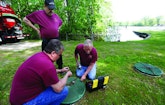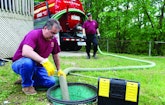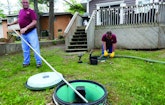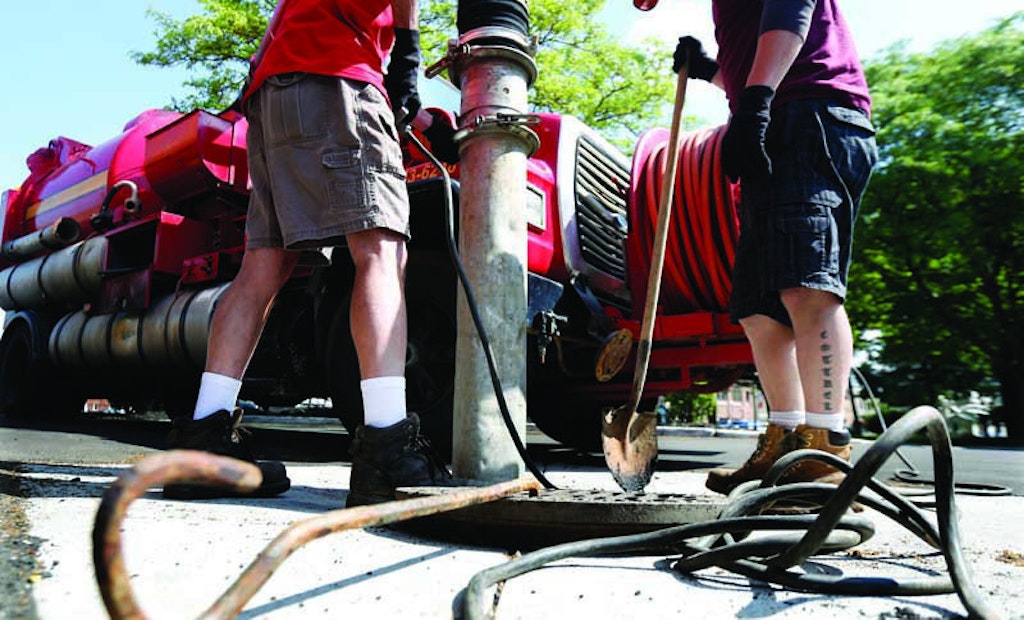
Interested in Trucks?
Get Trucks articles, news and videos right in your inbox! Sign up now.
Trucks + Get AlertsNorm Galligan says 1991 was a good time to go into business. Technicians were still cleaning catch basins with buckets and shovels when he stepped in as co-owner of Tri-County Power Rodding, but there was a ton of new technology on the market.
The new ownership team of Galligan, Cindy Bernia and Stan Mansfield sought to expand and move the Waterford, Michigan-based company into a new era.
“The three of us had all worked for the former owner when we purchased the company, which at the time had two trucks and two water jetters,” Galligan says, noting that they didn’t have a clear business plan in place at the time. “We just took over, and now we have two Vactors, two septic tank trucks, five trailer jetters and five service vans in the field, and we have a very dedicated staff. Cindy runs the office with our employee, Kim Brownson. Stan and I are the point men. We work in the field along with our technicians. And we both do sales and promotion.”
As the trio began putting money into the business, they immediately knew video inspection services were going to be essential. Many of their longtime customers were already asking for it.
“We got into that, and then it was amazing because we were just growing and growing,” Galligan says. “Things changed significantly. For years the company had been cleaning catch basins by hand — sending a man down with a 5-gallon bucket and a shovel. Then we bought a used Vactor, all outfitted. It didn’t cost that much, but from that things continued to expand.”
Galligan says they currently do about 45 percent residential, 25 percent industrial, 25 percent commercial and 5 percent municipal. Before they took over, 90 percent of the work was residential with a little commercial work mixed in.
On the job
The Tri-County business philosophy is built around a focus on smaller jobs and projects that can be handled in a timely manner.
“You make more money if you can get in and get out and not be tied up for long periods of time,” Galligan says. “This is why we’re able to do 29 or 30 jobs in a day. Some jobs might take 45 minutes — another two hours, depending on the situation. We might have a crew of two to four guys on a job for six or seven hours if they are cleaning the pipes in an apartment complex, or if we clean every mainline in a set of buildings every six months. That would be our company culture, as I said, get in and out and take care of that customer.
“We like where we are right now with our program,” Galligan says. “There’s a place in business where you are on the bottom or in the middle. We’re on the top right now. I like that we are where we are with what we do. We’re not likely to expand into other services.”
What Tri-County does very well is secure every opportunity that is presented within their scope of services. The company’s five John Bean trailer jetters (2,800 psi/40 gpm) are a big help in that regard.
“Our technicians will tow a water jetter behind the service van when they make a call,” Galligan says. “If they have a manhole-to-manhole problem, they have their jetter with them. If there is a culvert with a problem that runs under a driveway or road, they have the right equipment to take care of the problem.
“A technician might not use the jetter all day, but they have it with them if they need it,” he adds. “They don’t have to call in to say they need the jetter because they have it with them.”
When customers call and request someone to come out and bid a job, a member of the team will show up in a service van with all the equipment to do the job. “We will give them a price and say we can start the job right now,” Galligan says. “There is a big advantage to showing up ready to go to work. Give a fair price – you will get the job.”
He says sometimes a prospective customer will call for a price quote but won’t make a decision right away. But they usually call back within an hour.
“We’ll tell the person that we happen to have a truck in the area and our technician can be there in a short period of time and do the job. We’ll knock 10 percent off the price. It’s a job we’ll probably get — a job we almost lost. Sometimes you just have to use your head a little. That is how you get the jobs.”
Other contractors frequently use their services as well.
Fully equipped
Tri-County technicians are generally working with old cast iron, clay and PVC pipe. Systems are generally in good condition, but they encounter a fair share of pipe deflection and root intrusion. There are also FOG problems with restaurants and the normal cases where residents have sent too much food through their disposals or flushed items that cause backups.
Maintaining their equipment so it’s always ready for the next call is essential. Basic maintenance is performed in-house, and there’s an auto shop nearby where they can get quick service when required. When one of their two 1996 Vactors needs attention, there is a qualified shop just down the road.
Many of the regions they serve don’t have sewer systems, so adding septic pumping trucks was a necessity for the company’s growth. Even large apartment complexes can be on septic systems.
“We offer preventive maintenance on these systems, and we will install risers in septic tanks,” Galligan says. “We have a small backhoe (Coyote Loaders) that we can use when we need to dig up a tank.”
The septic trucks, a 2000 International with a 3,600-gallon tank and a 1996 Freightliner with a 2,600-gallon tank, are also beneficial in many emergency situations. Galligan cites a hospital job where they were jetting a plugged line while pumping out wastewater with the truck’s vacuum hose.
“As we are jetting and cleaning the sewer, we are sucking out the spoils at the same time. It keeps us from making a big mess. People we work for appreciate that we are able to clean up a job in a short period of time with our equipment.
“Septic service, though a small part of the business, is essential,” Galligan says.
Tri-County Power Rodding operates out of a central office with a separate yard for their trucks and other equipment, including two SeeSnake cameras with locating equipment from RIDGID and two power rodders from O’Brien Mfg. This is also where they meet every morning to pick up individual assignments for the day.
Seasoned squad
Because of the nature of their clientele, Tri-County Power Rodding is on call 24/7. Their customer list includes large hospitals, sports complexes, large theater venues, and condominium and apartment buildings within their area of service. Travel is also required since their service area stretches out over a 220-mile radius.
“This is messy work we are involved in,” Galligan says. “We are dealing with raw sewage — grease, garbage. Because we have been dealing with these things for a long time — and resolving stoppages — we are sometimes called on when other companies run into problems. We can do the tough stuff. It’s not always easy, but we are happy that we are often able to save a customer substantial money over the long haul.”
Galligan says their technicians have been on some pretty tough jobs over the years and have learned how to handle their equipment and tackle any challenge.
“Our guys have been with us for a while, often starting at an early age,” he says. “We train them and they understand our commitment — that we cannot ever close because of our customer base. When the phone rings we give a price. If it is Christmas Eve it might be a little higher. If they are willing to pay then we go.”
The two-man weekend shift is on a four-week rotation. Night duty is also on a rotation. Service technicians take their van home each evening and return by 8 a.m. the next morning to pick up a list of jobs formatted to cover a specific service area. For special projects, the Vactor will be scheduled to assist, as will the septic truck.
Galligan says it’s difficult to find qualified workers, and it can take three to four months to really assess an individual’s talent and dedication to the company and
the job.
The overall goal is to work as a team and provide their services to the best of their ability.
“We’ve learned over the years what works and how it works, and in doing so we have overcome a lot of problems,” he says. “We run our business much like an ambulance service. When it is an emergency, you have to get on it fast. When you have water pouring out the door, you have to get to it. That is
our job.”
